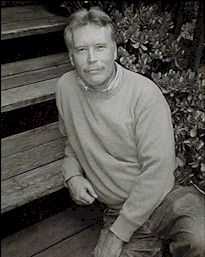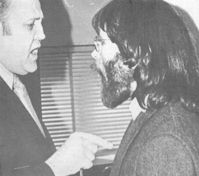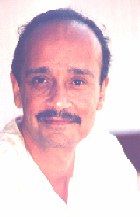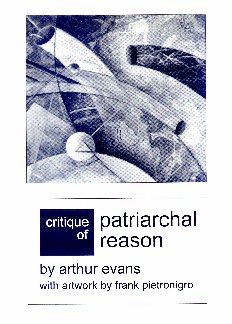 |


|
|
Interview by Raj Ayyar
When I first met Arthur in San Francisco in the early 90s, I realized that his attraction to Dionysos, the ancient Greek god of wine, orgy, madness, creativity, and celebration closely paralleled my own penchant for the Hindu god Shiva---he of the eternally erect phallus, the androgyne, and like Dionysos, a symbol of all the paradoxes of existence. Arthur, like me, wanted to go beyond the silly zero-sum, either/or games of the West, dating back at least to Aristotle, maybe, even far back as the pre-Socratic philosopher Parmenides. He wanted to embrace a concept of existence that is 'both --- and', recognizing myriad intermediate shades between black and white, and to say 'yes' to all of it. Arthur turned his back on the sterile world of Columbia, to found the 'new Sodom' and create the Faerie Circle, a precursor of the Radical Faeries. In this interview, what emerges is a radical politics of celebration. Raj Ayyar: Tell us something about your involvement with the Gay Activists' Alliance (GAA).
Arthur Evans: Well, post-Columbia, my lover Jacob and I entered a partnership that we called the Weird Sisters, after Macbeth. We bought the cheapest land we could find in Washington state and founded a sort-of-commune called New Sodom. We lived off wild berries and vegetables, sleeping in tents. In 1975, we formed the Faerie Circle, one of the predecessors of the Radical Faerie movement. It brought together gay sensibility, neo-paganism, and a sheer Whitmanesque celebration of the body and of sex. Raj Ayyar: Talking of neo-paganism, can you tell us about your book, Witchcraft and the Gay Counter-Culture? Arthur Evans: I am reviving it in a new edition due to appear soon—it will be called The Lady Rises in the East. Raj Ayyar: What about the Wicca revival? Is wicca a distortion of the old craft? Arthur Evans: It is a modern re-invention, not a continuation. They are trying to recover an ancient sensibility. A cultural re-creation.
Arthur Evans: It is a good way to avoid fundamentalism. Raj Ayyar: I try to stress this in my World Religions course. The downslide from the mytho poetic to the literal is what creates dogma and fundamentalism. Arthur Evans: Many admire organized religion. I happen to like disorganized religion. Raj Ayyar: I agree with you, Arthur. 'Disorganized religion' can lead to the mystical and the Dionysian in all faiths. Arthur Evans: Yes. Raj Ayyar: In your book Critique of Patriarchal Reason, you argued that science (like religion) is not without its punditry and dogmatism. Arthur Evans: That is true. All I'm arguing is that in science and religion there is a difference between the map and the terrain. Raj Ayyar: Going back to General Semantics, the map is not the terrain. Arthur Evans: That's right. Raj Ayyar: Like many, I have tended to stereotype Aristotle as the father of dualistic thinking---straight/gay, male/female etc.---you take it back to the pre-Socratic thinker Parmenides. Arthur Evans: That's right. It was his distinction between the 'Is' and the 'Is not' that started the Western either/or. Raj Ayyar: So, you see Aristotle carrying on the Parmenidean legacy? Arthur Evans: I see Socrates, Plato, and Aristotle as carrying on the Parmenidean myth, as have scores of Western logicians since. I do not see this myth as totally useless---it is just one map of the terrain. Raj Ayyar: What about Wittgenstein?
Raj Ayyar: I think you are very fair-minded to the later Wittgenstein---that he breaks out of the Western tradition in Philosophical Investigations. Arthur Evans: Yes, he was courageous in breaking with tradition. Russell was against it and the logical positivists were against it. Raj Ayyar: As an 'objective relativist', what do you think about inter-contextual dialogue? Suppose, I as a Westerner have strong issues about gay and lesbian rights in Zimbabwe, female circumcision in different cultures, Hindu fundamentalism etc. How can I articulate these issues without falling into a neo-colonial patronage of other cultures? Arthur Evans: Excellent question. It may be one of the burning questions of our time. Inclusive dialogue is the key. It should be possible to hear the other's voice, and bring all viewpoints to the table. Raj Ayyar: Do you think the 'Castro Clone' model of the all-American coming out is a universal paradigm? Arthur Evans: Of course, it's not. In addition, you cannot reduce any sexual orientation to the either/or of biology/culture. Raj Ayyar: Relativism is not always an unmixed blessing. Some religious fundamentalists have caught on to the idea of saying 'that's just your view and context' when you invite them to the table. Arthur Evans: Yes. What I am arguing for is a neo-humanism in values. Too often, humanism is reduced to a cheap scientism, and a downplaying of the rights of women, minorities, and colonized people. But there's something salvageable in humanism minus its white male imperialism, its classism, and its ethnocentrism. We can take what is valuable in this tradition, which is that it stands up to blind religiosity and an idolatry of science. Raj Ayyar: As an AIDS educator at a small community college in a small Florida backwater area, I know that my own AIDS prevention talks smack of sex-phobia. Does AIDS discourse always have to be sex-phobic? What I miss about the 70s and 80s is the freedom to explore, enjoy, and celebrate one's own and the other's body.
Arthur Evans: Take the Religious Right, which hates sex and sees it as the enemy and does not want to talk about it. Raj Ayyar: Don't you think it's because of the long standing Puritan streak in our culture that sees sex as forbidden fruit, obsessively attracted to it and repulsed by it at the same time? Arthur Evans: I think we need to re-open a humanist dialogue. The Religious Right not only hates sex it also fears discussion of sex. I think we need to insist on our first amendment right to discuss sex in all its dimensions openly. Any professor like yourself, who opens up this dialogue in his/her classroom, any critic or newspaper editor that pushes this is helping to start and consolidate this non-Puritan neo-humanist dialogue. Raj Ayyar: Don't you think that some feminists (I am not talking about writers of 'herotica' here or about feminists who are open-minded on this issue) find themselves in bed with the Religious Right in their passionate clamor for censorship of sex-discourses? I am thinking of MacKinnon, Dworkin, and others---indeed, of a strand in white American feminism. Arthur Evans: I tend to agree. It is disturbing. On the one hand, feminists (and I count myself as one) are certainly justified in underlining the miserable track record of men through the centuries. The fallacy consists in sliding from denouncing male abuse of power and sex to seeing all sex and sexuality as negative.
Arthur Evans: Our society does not deal with emotions very well, particularly sexual emotions. Raj Ayyar: Also, I am glad you haven't lost your leftist culture-critique edge---a large part of the Critique is dedicated to challenging "the bourgeois WASP male." Arthur Evans: (chuckling): Yes, I am still radical. Raj Ayyar: You've been quoted in the gay press as saying that if you'd realized that gay liberation would create the 'Castro Clone', you would never have left Columbia! Arthur Evans: Yes. That is true in a sense, though I have never given up hope. Right, now, I am engaging different sections of our culture, oppressed or otherwise, in a dialogue about the loss of meaning in mechanized industrial/post-industrial societies. Raj Ayyar: Do you think the New Age is seeking a sense of connection? Arthur Evans: It is stumbling in that direction. Raj Ayyar: And yet the New Age gets trapped in the dogmatism and fundamentalism that are part of the heritage of every organized religion. Tell me, are you really optimistic about the new century? Arthur Evans: All the institutional forces that have created the great powers are still in place but getting more technologically ramified and controlling in the century to come. I am very pessimistic about all this. Nevertheless, I still, weirdly and wonderfully, have hope. Raj Ayyar: Hope is the only thing that remains in Pandora's Box! Arthur Evans: All we can do is to make our small contribution, at least to wake up and function every morning . . . that is hope! Raj Ayyar: I agree with you---that is your existential affirmation every morning. Arthur Evans: That is a very good way to put it, Raj. Raj Ayyar: I am an incorrigible hope junky myself---it is what keeps me from reaching for the Prozac as much. Raj Ayyar is an Associate Professor of Philosophy and World Religions in a community college. He is an AIDS educator and an outspoken advocate of gay and lesbian rights, women's rights, and the rights of the oppressed other everywhere. |

© 1997-2000 BEI
 Arthur Evans
Arthur Evans  Arthur Evans (right) in action with GAA
Arthur Evans (right) in action with GAA  Philosopher Ludwig Wittgenstein
Philosopher Ludwig Wittgenstein  Raj Ayyar
Raj Ayyar  Raj Ayyar: You know, I was amused that in Critique, you refer to A.J. Ayer, the Oxford logical positivist, as exemplifying "the shriveled emotions of the WASP male" which is part of Anglo-European male conditioning.
Raj Ayyar: You know, I was amused that in Critique, you refer to A.J. Ayer, the Oxford logical positivist, as exemplifying "the shriveled emotions of the WASP male" which is part of Anglo-European male conditioning.